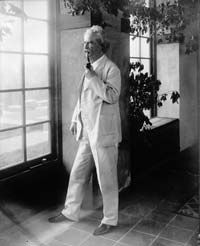You walk outside to leave for work and discover that it's incredibly cold and rainy. Your next-door neighbor is leaving at the same time. "Great weather, huh?" you say. "Yes, wonderful!" he replies. You drive to work, and after parking your car, you begin crossing the street to get to your office building. Suddenly a car comes out of nowhere and comes close to hitting you in the middle of the crosswalk. "Thanks a lot!" you yell. The driver rolls down his window and makes a rude gesture at you.
Advertisement
When you get inside and sit down at your desk, you notice that one of your co-workers is talking loudly on his phone. When he hangs up, you say, "I think you should talk a little bit louder next time -- the entire office didn't hear it." Your co-worker apologizes. Later that day, you're in the break room talking with other co-workers. One of them says that he's thinking of going to graduate school and then leaves the room. "Oh, I'm sure he'll do really well!" you say. Everyone laughs, because this co-worker is known for being on the flaky side.
What was really going on in each of these exchanges (other than the fact that you seem to be having a bad day)? The weather wasn't great. You really weren't grateful to the driver that nearly hit you, and you definitely didn't want your loud co-worker to get any louder. You didn't think that your other co-worker would do well in graduate school at all. You said the opposite of what you meant, and everyone that you spoke to knew it.
All of these instances were examples of sarcasm. In the first two examples, you used understatement to express your disgust and annoyance with the weather and the other driver. In the third, you made an indirect request of your co-worker. You really wanted to let him know that he was talking too loudly and needs to talk softly the next time he's on the phone, so you said the opposite to emphasize it. The last example is more subtle; on the surface, it seems like a nice thing to say. But your tone of voice showed that you were making fun of your co-worker instead. Sarcasm can be used in all kinds of ways -- it can express everything from anger to humor.
Sarcasm is an example of what some researchers call unplain speaking, ways of speaking in which what is said differs from what is meant. This category of language also includes forced politeness, ritual language, affectation and speaking in aphorisms. Some people consider sarcasm to be a cruder, "lower" form of irony, or simply a verbal form of irony. But sarcasm always hinges on the speaker; a person is sarcastic (a sarcast), but a situation is ironic. Sarcasm is not deceptive, although not everyone grasps the speaker's true intention.
In this article, we'll explore how people indicate that they intend to be sarcastic. We'll see how children learn sarcasm and find out how the brain processes it. Finally, we'll look at some examples of sarcasm in classic literature.
Advertisement



